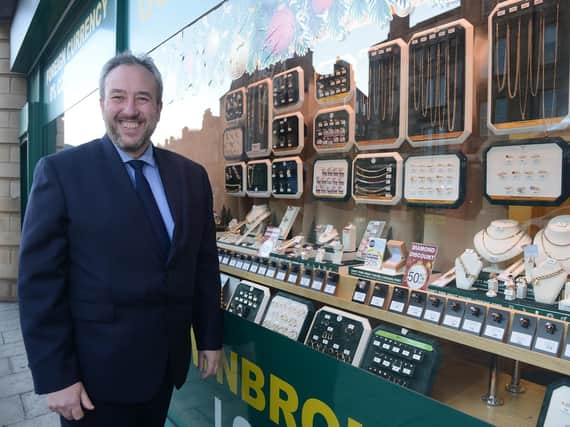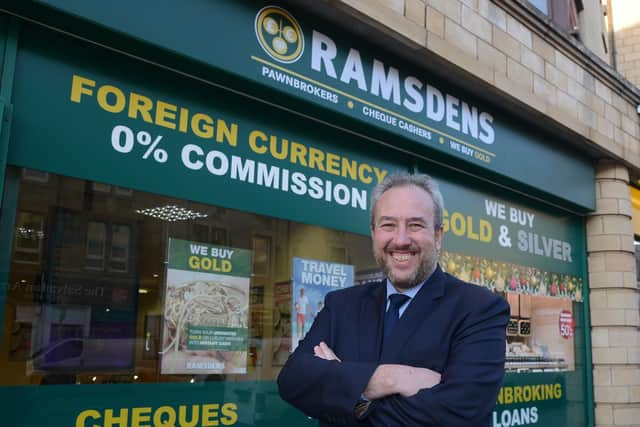The Big Interview: Ramsdens chief executive Peter Kenyon


When the powerful Medici family was split in two, half became bankers and the other half pawnbrokers, with the latter taking 50 per cent of the family crest, incorporating the familiar three gold balls.
The NPA also describes how in Britain in the late 19th and early 20th century there were nearly as many pawnbrokers as pubs.
Advertisement
Hide AdAdvertisement
Hide AdSuch outlets may be far less commonplace today, but the activity still has a key role to play, according to Ramsdens chief executive Peter Kenyon.


The firm offers pawnbroking loans of anything from £10 to £100,000 – with and average of around £226. And while it has diversified considerably, broadening the demographic of its customers as well as its revenue streams, Kenyon believes the age-old trade will always be part of its offering. “The people who use it and understand it love and appreciate the service that they get and the facility being there.”
Such a transaction has far less potential impact on the borrower’s creditworthiness – if a customer defaults on a pledge, there are no adverse consequences apart from losing the goods.
And as clients have to bring the item against which they are borrowing into a branch, it is not a spontaneous decision either, says Kenyon – who is also an NPA council member.
Prudent
He lays out how the company is taking a prudent, copper-bottomed approach to achieving a sustainably sparkling performance. Hallmarking itself as a financial services provider and retailer, Ramsdens’ remit also now encompasses foreign currency exchange (which generates the majority of revenues), precious metals buying and selling, and retailing second-hand and new jewellery.
“It’s about protecting what we absolutely have, making sure it’s solid, and being there tomorrow, the day after and ten years hence. This isn’t a quick growth story, it’s a carefully considered one… We generate cash profits, there’s nothing sexy or fintech about our business. We lend some people money and we get paid back, we buy some jewellery, we sell some jewellery and we provide people with holiday money.”
Ramsdens earlier this month unveiled its interim results for the period ending 30 September, with reported pre-tax profit up 23 per cent year on year to £6.2 million. Pawnbroking income was up 17 per cent to £4.3m; foreign currency exchange’s by 15 per cent to £8.4m, and jewellery retail revenue up by more than a fifth to £5.5m. Gross profit from purchases of precious metals grew 57 per cent to £4.1m.
Kenyon at the time said Ramsdens’ “value-for-money proposition has allowed the business to continue to grow its customer base and be resilient in what has been, and remains, a challenging consumer environment”.
Advertisement
Hide AdAdvertisement
Hide AdThe Middlesbrough-based business can trace its roots back to the 1970s, although its first outlet didn’t open until 1987. Now it has 161 stores (including four franchises) in the UK with a workforce of about 770.
Robust
It says it has a robust proposition in Scotland, where it has had a presence since 2009. Branches here amount to about 50 with 230 employees – encompassing locations including intu Braehead and Newton Mearns, Alloa, Aberdeen, Inverness, Falkirk and Paisley.
It is also set to move into Shandwick Place in Edinburgh, scheduled to open in the late spring, with the other end of the city also under consideration. Additionally, the firm’s heads of retail and internal audit are both based in Scotland.
Kenyon was appointed chief executive at the start of 2008, after joining the firm in November 2001 as operations director. Tasked with overseeing all operations of the business and implementing its strategy, he led the management buyout in 2014 and then became a director.
The MBO also saw NorthEdge – which manages £650m of private equity funds aimed at lower-mid market buy-out and development capital transactions in the North of England and the Midlands – back the business. “They were people that we could get on with, you could have good conversations with,” says Kenyon.
Ramsdens’ strategy was clearly delineated in order to be a resilient proposition, for example, polishing its foreign currency and retail arms.
“Pawnbroking was always strong, gold buying was always strong. And we set about making our business more solid, the balance sheet more solid, all that sort of good stuff. And once it was more solid, we were able to be in a great position to start to grow again. And that’s what we did.”
Ramsdens in 2017 listed on the London Stock Exchange’s junior Alternative Investment Market. The move, which valued it at £27m, saw a partial exit by NorthEdge.
Benefits
Advertisement
Hide AdAdvertisement
Hide Ad“One of the benefits of the exit that we had with the listing is the team stayed together, the business stayed together – the only thing that changed was we now have city institutions and private people investing in us as opposed to a private equity business,” says Kenyon.
“I have great responsibility because the widow and orphan can invest in our business as a ‘man on the street’, so we have to manage it prudently and well, and we also do that for some of the staff who are shareholders, as well as our city institutions who are investors.”
The UK pawnbroking landscape has not been without its casualties, such as Albemarle & Bond (A&B), which ceased trading earlier this year despite having being revived after falling into administration in 2014. Rival H&T – which says it is the largest pawnbroker in the UK and started out in London in 1897 – snapped up A&B’s 113 “pledge books” (loans linked to customers’ pawned items) in an £8m deal.
Spreading the message that Ramsdens does more than just pawnbroking is key for Kenyon, who says such shops were previously small and “tucked away”. He explains: “You’d have a comfy chair and you’d wait for the customer to come through the door. And that’s what the old pawnbrokers of the 90s did, but we were younger and more modern and grew. And the only way that we could grow was having the diversified services that we do have and they all pulled away.”
Indeed, Kenyon says Ramsdens has changed its name from Ramsdens Pawnbrokers as it seeks to appeal to more people, and revamped its branches with posters, “like banks do in their windows to advertise our other services rather than having blinds”, as well as TVs.
He also points out that it has got its jewellery offering in one part of the store and booths, separated by a wall to enhance privacy, for, say, pawnbroking or picking up some currency to take on holiday.
“We’ve evolved, and would probably like to think we’ve led that in our industry, that bit of modernisation, and because we are the younger of the major brands, although there’s probably only two of us left now.”
Progress
The 2008 market crash provided opportunity in the crisis, with Ramsdens able to capitalise on falling rents and closing retailers – and move into higher footfall locations. Growth – the firm had just 19 premises at the start of 2008 – has also been inorganic, with Kenyon responsible for more than 25 acquisitions for the group, including a selection of stores from The Money Shop.
Advertisement
Hide AdAdvertisement
Hide AdThis backed its stated medium-term growth strategy of expanding its presence across target regions in the UK at a pace of 12 outlets a year. Its next milestone is 200, Kenyon states, which it should reach in three or so years at that pace.
He is able to leverage the knowledge of finance he gained in the 17 years he spent with Yorkshire Bank, laughing that he chose such a career path as he would get weekends off and be able to play golf.
Scoring highly in his banking exams, “something clicked with me… the beauty of banking is you see a hell of a lot, you see a lot of different businesses as customers”.
His time in business banking provided an insight into “all sorts of” different firms and disciplines, and dealing with clients. “You get to understand the real benefits of managing cash flows and your way around the accounts and the balance sheet and all the rest of it, so, I’m not an accountant, but I know my way around a set of accounts.”
Kenyon also spent time in the lender’s head office, including operations design business, which taught him to examine how things work.
His banking background also came to the fore when Ramsdens faced the gold price losing its lustre in 2013. “Whilst our profits dropped, we generated cash… we looked at our cost base and we stayed profitable and going to position to grow again.”
Now, as 2020 moves into striking distance, “we’ve got our business into great shape, we have a very strong balance sheet, a great cash position – we are a good, solid little business”.
